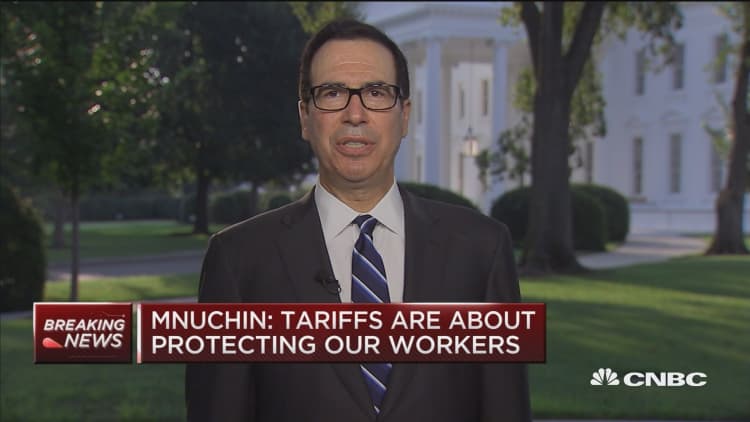
The Chinese government will continue implementing measures in order to cushion its economy from the impact of the ongoing trade spat with the U.S., a leading China economist said Wednesday.
"We are not expecting any major growth correction because we think the potential impact from trade tariffs will be partially cushioned by the policy easing measures taken by the policy makers," Robin Xing, chief China economist at Morgan Stanley, told CNBC at the Morgan Stanley Technology, Media and Telecom Conference in Beijing.
Just last week, the U.S. and China slapped tariffs on $16 billion worth of goods on each other. Both countries also imposed tit-for-tat levies on $34 billion worth of each other's imports in July.
Market watchers are now keeping their eyes on a fresh round of U.S. tariffs on $200 billion worth of Chinese goods expected later this year.
If the U.S. imposes those additional tariffs, the impact could be "amplified" by how connected supply chains in East Asia are to China, Xing said.
In fact, the trade war's disruption to supply chains could cut 0.7 percentage points from China's growth, he said.
That will spur Beijing to take up more meaningful easing measures such as tax cuts and boosts to credit and liquidity in China's financial system.
U.S. tariffs appear to be affecting the Chinese economy already as the latest manufacturing data show slowing export orders. Xing said he expected economic activity to weaken further in August, although he suggested Beijing will likely cushion that impact in September and October through new bonds.
By the fourth quarter, infrastructure spending will also soften the blow from the U.S. tariffs, Xing told CNBC.
Even though there are many concerns about debt in China, Xing said the easing this time will be "defensive" and not as "massive" as recent stimulus such as what was injected in 2008 during the global financial crisis. Beijing will not cut interest rates or loosen property policies, Xing projected.
Beijing has been managing a growth slowdown in China after three decades of breakneck growth fueled largely by debt.
Morgan Stanley expects China's GDP growth to slow to 6.4 percent in the first half of next year from the official 6.8 percent figure for the first half of this year, Xing said.
WATCH: Sec. Mnuchin: We're not looking to harm Chinese economy


